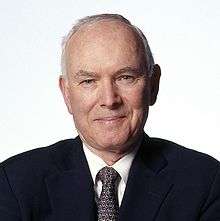Robert Hogan (psychologist)
Robert Hogan (born 1937) is an American psychologist known for his innovations in personality testing, and is an international authority on personality assessment, leadership, and organizational effectiveness.
Robert Hogan | |
|---|---|
 | |
| Born | Robert Hogan 1937 (age 82–83) |
| Citizenship | American |
| Alma mater | University of California, Berkeley |
| Known for | Personality testing |
| Spouse(s) | Joyce Hogan (m. 1974; d. 2012) Wendy Hogan (m. 2014) |
| Scientific career | |
| Fields | Psychology |
| Institutions | Johns Hopkins University, University of Tulsa |
Education and career
Hogan earned a Ph.D. from University of California, Berkeley.[1] He was McFarlin Professor and Chair of the Department of Psychology at The University of Tulsa from 1982 to 2001. Prior to that, Hogan was Professor of Psychology and Social Relations at Johns Hopkins University. He has received a number of research and teaching awards and is president and co-founded Hogan Assessment Systems in 1987, based in Tulsa, Oklahoma.[2]
Research
Hogan has contributed to the development of socio-analytic theory, which maintains that the core of personality is based on evolutionary adaptations. Humans, in this view, always live in groups and groups always demonstrate status hierarchies. This in turn leads to two further generalizations: people are motivated to get along with other group members but also to get ahead (to enjoy the prequisites of status). Hogan, an iconoclastic observer of American psychology, maintains that personality is best examined from the perspective of the observer (reputation) rather than the actor (a person's identity). As a consequence, Hogan has insisted that personality tools should be evaluated in terms of how well reputations (defined on personality tests) predict behavior on the job and in relationships.
Hogan is the author of more than 300 journal articles, chapters and books.[3] His book Personality and the Fate of Organizations was published by Lawrence Erlbaum Associates in June 2006. The 167-page book offers a systematic account of the nature of personality, showing how to use personality to understand organizations, to staff teams, and to evaluate, select, deselect and train people. He is the co-editor of the Handbook of Personality Psychology and has published the Hogan Personality Inventory, the Hogan Development Survey, the Motives Values and Preferences Inventory, and the Hogan Business Reasoning Inventory, as well as the Hogan Guide (2007). In 2012 he and Gordon Curphy authored The Rocket Model, a practical model for building and managing high-performing teams.[4]
In 1994, Hogan was one of 52 signatories on "Mainstream Science on Intelligence",[5] an editorial written by Linda Gottfredson and published in the Wall Street Journal, which declared the consensus of the signing scholars on issues related to the controversy about intelligence research that followed the publication of the book The Bell Curve.[6]
He is a fellow of the American Psychological Association and the Society for Industrial/Organizational Psychology.[7][8]
References
- http://www.ok.gov, OK.gov - Oklahoma's Official Website. "Oklahoma Psychologists License Renewal". pay.apps.ok.gov. Retrieved 2016-06-07.
- "Team Hogan | Hogan Assessments". www.hoganassessments.com. Retrieved 2016-06-03.
- "Why Hogan? | Hogan Assessments". www.hoganassessments.com. Retrieved 2016-06-23.
- Curphy, Gordon; Hogan, Robert (2012-04-26). The Rocket Model: Practical Advice for Building High Performing Teams. Hogan Press. ISBN 9780984096985.
- Gottfredson, Linda (December 13, 1994). Mainstream Science on Intelligence. Wall Street Journal, p A18.
- http://www1.udel.edu/educ/gottfredson/reprints/1997mainstream.pdf
- "APA Membership Types: Fellows". http://www.apa.org. Retrieved 2016-06-23. External link in
|website=(help) - "SIOP Fellows". www.siop.org. Retrieved 2016-06-23.